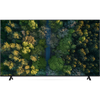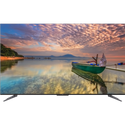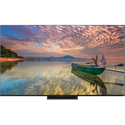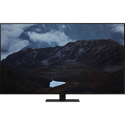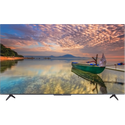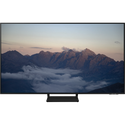A comparison of specs, key information, reviews, and best pricing from top retailers
Last updated -- hours ago | Report incorrect information
What we think

The PerfectRec TV team Learn more
Updated January 10, 2024·
Based on the comparison, the Hisense U7K is a better choice if you're looking for higher performance in gaming and for watching movies. It has a higher overall picture quality and is particularly better for dark rooms. Conversely, the LG NANO75 may be a better option if you are looking for a more affordable TV, as it is often significantly less expensive. However, it won't perform as well in a bright room and has lower picture quality in general. Additionally, the Hisense U7K comes with a 144Hz screen and is capable of providing smoother motion for fast-paced content, whereas the LG NANO75 has a 60Hz screen, which may not be as smooth for gaming or action-packed scenes. Give Feedback
this description is based on the product variant with some specs and product variant with some specs. At the time of writing, the variant with some specs cost some dollars and the variant with some specs cost some dollars.
Advantages of the Hisense U7K (LCD)
- Very good for bright room
- Good for dark room
- Very good for gaming
- Very good for movies & TV
- Very good for news, talk, & other TV
- Very good for cartoons & animation
- Good for use as monitor
- Very good reflections
Advantages of the LG NANO75 (LCD)
- Good motion processing
Key differences
Picture Quality
7.9

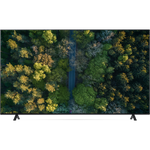
5.6
7.13/10
CONTRAST
4.97/10
8.3/10
COLOR VOLUME SCORE
5.8/10
miniLED FALD
PANEL TYPE
LED
ADS / IPS
PANEL SUB-TYPE
IPS
The Hisense U7K (LCD) has good picture quality, while the LG NANO75 (LCD) has poor picture quality.
Movies & TV
8.0


5.2
7.13/10
CONTRAST
4.97/10
7.1/10
BLACK UNIFORMITY
5.0/10
7.0/10
UPSCALING
7.5/10
Yes
HDR10 SUPPORT
Yes
Yes
HDR10+ SUPPORT
No
Yes
DOLBY VISION SUPPORT
No
The Hisense U7K (LCD) is very good for movies & TV, while the LG NANO75 (LCD) is poor.
The Hisense U7K provides a superior movie and cinematic experience compared to the LG NANO75 due to its excellent contrast, effective local dimming, and high black uniformity, which are crucial for deep black levels and minimizing blooming around bright objects in dark scenes.
Gaming
8.7


5.7
8.0/10
RESPONSE TIME SCORE
6.1/10
8.0/10
INPUT LAG SCORE
10.0/10
3.5/10
MOTION PROCESSING
7.5/10
84.0/100
GAMING LOCAL DIMMING
0.0/100
8.2/10
GAME HDR BRIGHTNESS SCORE
5.7/10
The Hisense U7K (LCD) is very good for gaming, while the LG NANO75 (LCD) is poor.
Cartoons & Animation
8.7


5.9
8.4/10
COLOR GAMUT SCORE
6.5/10
8.3/10
COLOR VOLUME SCORE
5.8/10
8.4/10
SDR BRIGHTNESS SCORE
5.8/10
8.8/10
COLORS OUT OF THE BOX SCORE
7.7/10
7.5/10
GRAY UNIFORMITY
6.0/10
The Hisense U7K (LCD) is very good for cartoons & animation, while the LG NANO75 (LCD) is poor.
The Hisense U7K displays cartoons and animation effectively because it has very good color performance right out of the box and a wide color gamut, contributing to more vibrant and accurate colors. In contrast, the LG NANO75 falls short in animation display due to its only good color accuracy out of the box and a limited color gamut which results in less vivid colors and narrower color representation.
News, Talk, & Other TV
8.3


6.1
8.4/10
SDR BRIGHTNESS SCORE
5.8/10
7.0/10
UPSCALING
7.5/10
The Hisense U7K (LCD) is very good for news, talk, & other TV, while the LG NANO75 (LCD) is only fair.
The Hisense U7K stands out for watching news and TV programs due to its very good SDR brightness, enhancing visibility even in well-lit rooms, and its superior upscaling which ensures lower resolution content looks crisp. In contrast, the LG NANO75 falls short with less impressive SDR brightness that could struggle in bright conditions and fair colors out of the box, which may not appear as vibrant or accurate without adjustment.
Bright Room
8.0


5.8
6.1/10
VIEWING ANGLE
6.8/10
8.4/10
SDR BRIGHTNESS SCORE
5.8/10
7.8/10
HDR BRIGHTNESS SCORE
5.5/10
8.8/10
REFLECTIONS SCORE
7.8/10
The Hisense U7K (LCD) is very good for bright room, while the LG NANO75 (LCD) is poor.
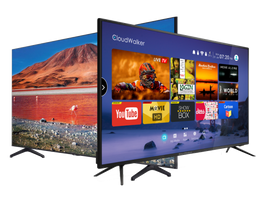
Let Us Help Find Your Perfect TV
Find your new TV
Key similarities
Sports
6.4


6.7
3.5/10
MOTION PROCESSING
7.5/10
144Hz
REFRESH RATE
60Hz
8.0/10
INPUT LAG SCORE
10.0/10
7.0/10
UPSCALING
7.5/10
8.4/10
SDR BRIGHTNESS SCORE
5.8/10
Yes
HLG SUPPORT
Yes
The LG NANO75 (LCD) and Hisense U7K (LCD) are both only fair for sports.
The Hisense U7K performs better in motion processing and response time, which are essential for sports watching, leading to smoother motion during fast scenes, but has a narrower viewing angle and stronger reflections that could interfere with visibility in well-lit rooms or from the side. The LG NANO75 offers wider viewing angles, making it a better choice for group viewing, but falls short in motion clarity and speed of response, which may result in motion blur during fast sports action, though it manages reflections better making it a more suitable option for bright rooms.
Cost
$1,400


$1,350
$500
$1,000
$1,500
$2,000
$2,500
The Hisense U7K (LCD) has a price of $1,400 and the LG NANO75 (LCD) costs $1,350.
Give feedback
We’re constantly working to improve.
How the Hisense U7K (LCD) and the LG NANO75 (LCD) compare to other TVs
Spec Comparison
| Hisense U7K (LCD) | LG NANO75 (LCD) |
GENERAL | |||
|---|---|---|---|
| Price | |||
$1,400 | $1,350 | ||
Brand | |||
Brand | Hisense | LG | |
Release Date | |||
Release Date | August 1, 2023 | March 5, 2022 | |
Full name | |||
Full name | 75U7K | 75NANO75 | |
Screen Size | |||
Screen Size | 75" | 75" | |
Screen Resolution | |||
Screen Resolution | 4K | 4K | |
TV FEATURES | |||
|---|---|---|---|
Operating System | |||
Operating System | Google TV | webOS | |
Sound Quality Score | |||
Sound Quality Score | 7/10 | 6.1/10 | |
NextGen Ready | |||
NextGen Ready | Yes | No | |
HDMI Ports | |||
HDMI Ports | 4 | 3 | |
Coax Ports | |||
Coax Ports | 1 | 1 | |
DISPLAY QUALITY SCORES | |||
|---|---|---|---|
Picture Quality Score | |||
Picture Quality Score | 8/10 | 5.7/10 | |
Bright Room Score | |||
Bright Room Score | 8/10 | 5.8/10 | |
Gaming Score | |||
Gaming Score | 8.8/10 | 5.7/10 | |
Movies & TV Score | |||
Movies & TV Score | 8.1/10 | 5.3/10 | |
Sports Score | |||
Sports Score | 6.5/10 | 6.7/10 | |
PHYSICAL | |||
|---|---|---|---|
Dimensions w/o Stand (H x W x D) | |||
Dimensions w/o Stand (H x W x D) | 38" x 65.9" x 3.1" | 38" x 66.1" x 2.4" | |
Dimensions with Stand (H x W) | |||
Dimensions with Stand (H x W) | 40.4" x 65.9" | 40.4" x 66.1" | |
Weight without Stand | |||
Weight without Stand | 62.4 lbs | 69.2 lbs | |
VESA Mount | |||
VESA Mount | 400 x 400 | 400 x 400 | |
DISPLAY | |||
|---|---|---|---|
Color Depth | |||
Color Depth | 10 bit | 10 bit | |
Black Frame Insertion | |||
Black Frame Insertion | Yes | No | |
Auto Low Latency Mode | |||
Auto Low Latency Mode | Yes | Yes | |
Contrast | |||
Contrast | 7.1/10 | 5/10 | |
Local Dimming | |||
Local Dimming | 7.6/10 | 2.5/10 | |
SOUND | |||
|---|---|---|---|
Speaker Setup | |||
Speaker Setup | 2.1.2 | 2.0 | |
Speaker Power | |||
Speaker Power | 50 W | 20 W | |
Dolby Atmos | |||
Dolby Atmos | Yes | Yes | |
DTS:X | |||
DTS:X | Yes | No | |
Get a great deal on the Hisense U7K (LCD) or the LG NANO75 (LCD)
About Hisense
Hisense, a Chinese TV manufacturer, entered the US market in approximately 2011 and has since acquired TV divisions from various companies such as Toshiba, Sharp, Hitachi, and NEC. Currently ranking as the fourth largest vendor in terms of sales volume, Hisense aims to capture a wide range of TV budget segments. They offer exceptional value with TVs that often outperform their competitors at similar price points, making them a compelling choice for consumers. In the US, they use Google TV as their smart TV software which provides the largest app selection and a very modern user interface, however it is not as user friendly as the software from other vendors.
About LG
LG, a prominent TV brand from Korea, has played a significant role in popularizing OLED TVs. OLED technology is hailed as the future of TV technology. Their TVs employ WebOS, a proprietary smart TV software that not only offers seamless functionality but also includes gaming-specific features, earning praise from players worldwide. Often regarded as the gateway to unparalleled viewing experiences, LG's mid-range OLEDs come highly recommended, making them a worthwhile investment for those willing to stretch their budget for superior quality.
Give feedback
We're constantly perfecting our model
TV guides you might be interested in
More comparisons for you
FAQs
FAQs about TVs
Why trust us
This information was produced and vetted by the PerfectRec TVs team. We are a product research and recommendation organization that meticulously reviews and evaluates the latest TV information and makes it digestible for you.
By the numbers
385
TVs evaluated
33,110
TVs stats compiled
21
Proprietary TVs ratings developed
164,730
Recommendations made
24,710
Consumer hours saved
About the TV team
Joe Golden, Ph.D
CEO and TVs Editor
Joe is an entrepreneur and lifelong electronics enthusiast with a Ph.D in Economics from the University of Michigan.
Jason Lew
Staff Expert & Software Engineer
Jason is a staff expert and software engineer that has been making laptop recommendations for 7 years and moderates one of the largest laptop subreddits.
Chandradeep Chowdhury
Staff Expert & Software Engineer
Chandradeep is a staff expert and software engineer and expert in televisions and monitors. He’s been making monitor recommendations for ten years.
Jaime Roldán
TVs Expert
Jaime is a Colombia-based TV expert. He is an electronics engineer with 8 years of experience in the telecom sector and has been making TV recommendations for 12 years.

